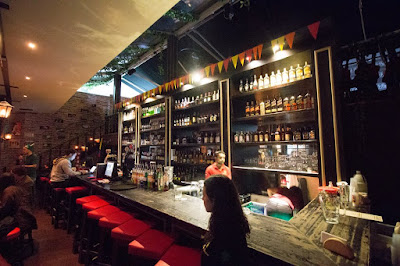For the last 20 months Bogotá's only regular quiz (trivia) night, IQuiz, has been on the go. It's still quite a niche event, a nature of the beast that it is, perhaps.
Nonetheless, as a labour of love, it's been relatively successful and, going by the reaction of those who participate, an enjoyable, fun and lively event, which is what we want it to be.
From an organisational and venue-sourcing point of view, it's been quite an experience.
 |
| Nice place, but overpriced for what you get ... |
You see, for us, IQuiz is not meant to be exclusive, set aside for just a certain sector of Bogotá's inhabitants. Yet, in such a disparate, economically unequal city, balancing the needs of IQuiz with the desire to make it accessible to as many as possible has been tricky.
Generally speaking, the spacious, bar-style venues IQuiz requires are only to be found in the more affluent parts of the city, and that means paying multiples of what you'd pay in a more bog-standard setting (Colombia's strata system, where certain parts of the city pay much more for services, plays a part in this).
Generally speaking, the spacious, bar-style venues IQuiz requires are only to be found in the more affluent parts of the city, and that means paying multiples of what you'd pay in a more bog-standard setting (Colombia's strata system, where certain parts of the city pay much more for services, plays a part in this).
Or if they're not in exclusive areas, such places usually sell their refreshments far pricier than the establishments around them. A case of 'give it a Western tinge, increase the price'.
More than just giving a place a Western flair (in music and style), the more Westerners or foreigners with money who frequent it, the greater justification for price hiking. Fair enough, if the clientele is happy to pay, repeatedly, your prices and with business going well, why would you consider lowering them?
Indeed, in many of the pubs we're referring to, the customers are people earning salaries that would be considered decent in more developed countries, with some being paid in dollars or euros.
More than just giving a place a Western flair (in music and style), the more Westerners or foreigners with money who frequent it, the greater justification for price hiking. Fair enough, if the clientele is happy to pay, repeatedly, your prices and with business going well, why would you consider lowering them?
Indeed, in many of the pubs we're referring to, the customers are people earning salaries that would be considered decent in more developed countries, with some being paid in dollars or euros.
Also, there's the strategy, so it goes, that maintaining higher-than-average prices helps to keep undesirables away. Yet, for the likes of Bogotá's Zona T and Parque 93, it's unlikely that the ñero types will flock there to socialise, whatever the price. They might come, as some already do, for less innocent reasons. (In any case, gomelos — Bogotá's posh — can be just as unbearable as their ñero opposites.)
Obviously, it's a numbers game on two fronts: if people are still coming and you're in the black financially wise, then great.
However, from what we've witnessed, it appears that some of these 'finer' watering holes aren't exactly fulfilling their potential. It's actually difficult to see how they are making money at all. It's either a case of the owners having deep pockets or the business is being used for more sinister reasons.
Not only are the places that fall into this underperforming category overpriced and generally underwhelming, they have a service charge to boot.
Not only are the places that fall into this underperforming category overpriced and generally underwhelming, they have a service charge to boot.
Now, tipping for a job well done is one thing, but almost forcing people to pay extra for being served when, more often than not, the ones doing the serving behave as if they'd prefer to be doing anything but, that's just a deal-breaker. We'll take the personal touch of the local tienda over such coldness any day.
It would be interesting to see some of these stale Western-style pubs adopt a sort of Ryanair approach: cut back the prices substantially to get customer numbers up.
It would be interesting to see some of these stale Western-style pubs adopt a sort of Ryanair approach: cut back the prices substantially to get customer numbers up.
The arrival over the last couple of years of the Bogotá Beer Company (BBC) bodega franchise in the city was a half-turn in that direction. However, considering these bodegas only sell the 'fancy' BBC beers, they're still somewhat exclusive.
A lack of start-up capital is why the Wrong Way Pub hasn't opened its doors yet. Of course, were that to happen, we might just find that running a bar à la Ryanair wouldn't be viable.
A lack of start-up capital is why the Wrong Way Pub hasn't opened its doors yet. Of course, were that to happen, we might just find that running a bar à la Ryanair wouldn't be viable.
Be that as it may, for the moment, we'll try to keep bringing IQuiz and its associated discounts to a venue near you!
____________________________________
Facebook: Wrong Way Corrigan - The Blog & IQuiz "The Bogotá Pub Quiz".
____________________________________
Facebook: Wrong Way Corrigan - The Blog & IQuiz "The Bogotá Pub Quiz".


